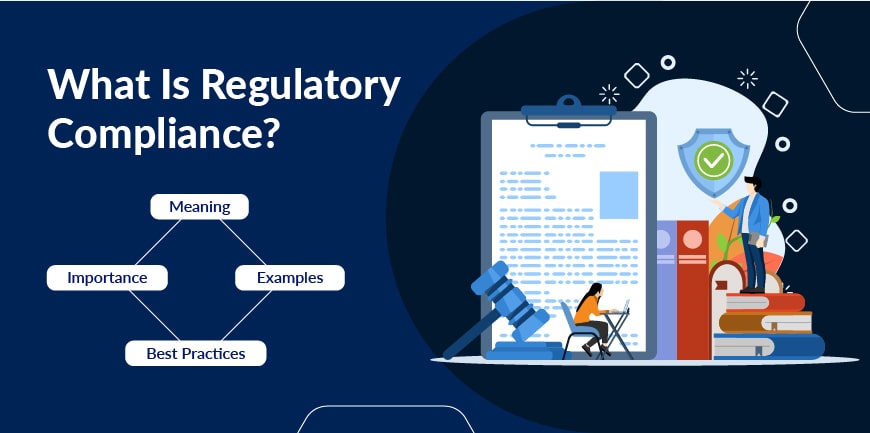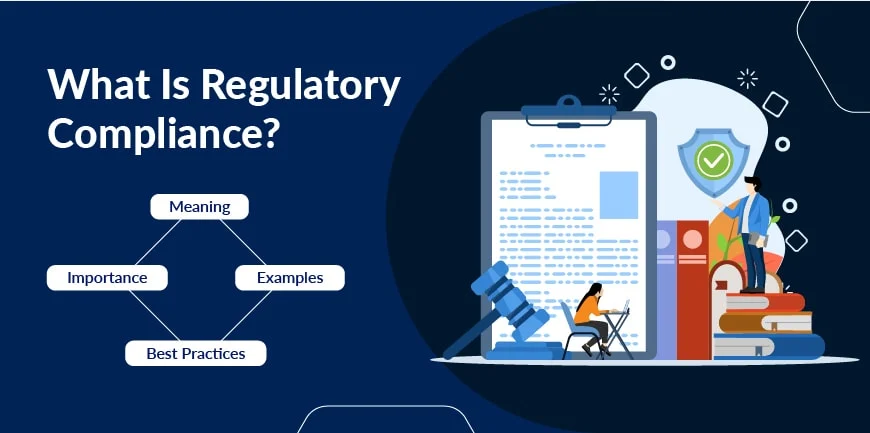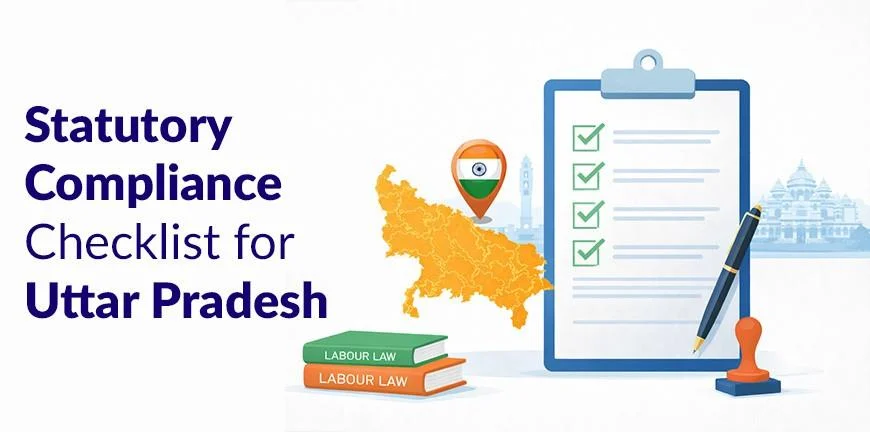
What is CLRA Compliance? Full Form, Objectives, Responsibilities
28/04/2025
What is Flexible Talent? Benefits, Types, Challenges, Trends
30/04/2025- What is Regulatory Compliance?
- Why is Regulatory Compliance Important?
- What are the Benefits of Regulatory Compliance?
- How Do Organizations Ensure Regulatory Compliance?
- What are the Challenges in Regulatory Compliance?
- What are the Consequences of Regulatory Non-Compliance?
- What are the Best Practices to Ensure Regulatory Compliance?
- What are the Key Areas and Examples of Regulatory Compliance?
- Here are a few regulatory compliance examples:
If you are a startup trying to establish your brand or a Fortune 500 company striving to enhance your reputation in the evolving business landscape, meeting regulatory compliance requirements is key to accomplishing this endeavor. Companies that fail in their journey to achieve regulatory compliance may end up paying a heavy price. To prevent this catastrophe, let’s understand compliance meaning, importance, benefits, challenges, and best practices in detail!
What is Regulatory Compliance?
Regulatory compliance is a continuously evolving process that compels organizations operating in India to align with a set of laws, regulations, policies, procedures, standards, and other set of guidelines prescribed by the state & central governments. Any violation or discrepancies in meeting these legal requirements can lead to serious consequences like penalties, fines, lawsuits, criminal liability, & reputational damage. A typical company in India has to navigate over 1,536 Acts, requiring 69,233 compliances & 6,618 filings across central, state, and local levels.
Based on the industry type and jurisdiction, regulations vary significantly. Large organisations with global presence must abide by pertinent laws and regulations in all the countries they operate. Industries such as IT, fintech, healthcare, etc., often have to deal with complex regulations and compliance frameworks due to their impact on the economy, business, & health infrastructure, respectively. Additionally, most industries and establishments are at significant risk of cyber breaches due to the increasingly complex and sophisticated cyberattacks.
Regulatory compliance, although a legal requirement, can also serve as a guiding torch to help organisations maintain business continuity, increased stakeholder trust, streamlined operations, enhanced brand reputation, etc. Moreover, legal and regulatory compliance serves as the foundation for building a safe and secure workplace for both employers and employees.
Why is Regulatory Compliance Important?
Regulatory Compliance plays a significant role in proving a company’s commitment towards excellence and transparency. The Regulatory compliance requirements mandate organisations to identify and mitigate discrepancies occurring in business operations and procedures proactively.
Also, regulatory compliance is not restricted to specific business areas but encompasses every action taken by the organisation, from registering the business to submitting annual tax file returns.
Once companies establish themselves as flag-bearers of regulatory compliance, the stakeholders and customers will automatically bring more investment, leading to profitability and increased brand reputation.
Contrarily, if companies fall into the other end of the spectrum and create regulatory compliance issues, they invite a lot of trouble in the form of penalties, legal cases, hefty fines, brand reputation damage, and in extreme cases, closure of business.
What are the Benefits of Regulatory Compliance?
The key benefits of advanced regulatory compliance are:
1. Prevent legal hassles and penalties
By fulfilling all the necessary regulatory compliance requirements, companies can prevent lawsuits and penalties.
2. Enhanced efficiency and workplace safety
To meet regulatory and compliance requirements, companies must streamline their operations and procedures. Additionally, workplace safety protocols and POSH Compliance policies must be implemented to prevent workplace accidents and sexual harassment incidents. As a result, a safe working environment will be created, leading to more productivity and enhanced efficiency.
3. Fostering Healthy Competition
Regulatory compliance in HR will eliminate unethical practices in the organisation and give rise to a working environment that fosters healthy competition.
4. Improved branding
Meeting legal regulatory compliance can improve public relations and increase stakeholder trust. By showcasing a strong commitment towards creating a safe and transparent workplace, the brand reputation of the company will rise, attracting more investors and customers.
How Do Organizations Ensure Regulatory Compliance?
Here are the steps to ensure regulatory compliance:
1. Determine Applicable Regulations and Laws
Companies must know which regulations and laws apply to their firm. Typically, regulations and laws are applied based on the type of industry, number of employees, product or service type, location, etc.
2. Identify Specific Regulatory Compliance Requirements
Once the relevant laws and regulations are finalised, start going into the specifics. Break down each law into actionable steps that will help the company achieve 100% legal regulatory compliance.
3. Conduct an initial audit
Before implementing regulatory compliance policies on a full scale, it is better to check where a company stands currently. Conducting an internal audit will help you identify regulatory compliance issues both in operations and documentation.
4. Establish and Document Compliance Policies and Procedures
After we get a clear understanding of what needs to be done, it’s time for action. Develop comprehensive policies and procedures that align with regulatory and compliance requirements and ensure employees and managers are following them religiously.
5. Train and Reinforce Compliance
Employees and managers must receive regular training on how to achieve regulatory compliance. They must understand every procedure in detail and apply it practically. It will ensure compliance is achieved on a day-to-day basis, and there will be no room for any regulatory compliance issues.
6. Leverage Regulatory Compliance Management tools
Technology can be a great ally when it comes to meeting regulatory compliance requirements. Companies must implement automation and software wherever possible to reduce human intervention.
Regulatory compliance management tools like document management systems, payroll management systems, regulatory compliance analytics software, etc., can help companies streamline business operations and record-keeping.
7. Appoint a compliance officer
Companies must appoint an exclusive compliance officer to oversee the compliance activities and ensure the best outcomes. However, a better option is to partner with a top regulatory compliance agency like ALP Consulting, as they will offer end-to-end regulatory compliance services and take responsibility for helping the company achieve 100% compliance every year.
What are the Challenges in Regulatory Compliance?
The top challenges encountered by companies during the quest to achieve regulatory compliance include:
1. Navigating through an evolving and complex regulatory landscape
Indian regulations and laws are complex and subject to frequent amendments and changes. Navigating through such tricky frameworks can pose a huge challenge, especially for companies with limited resources.
2. Skill gaps and resource constraints
Finding an internal employee who is well-versed in regulatory compliance requirements and laws can be challenging. Since compliance applies to all aspects of business, we must build cross-functional teams for managing compliance, which can be expensive and may not yield the desired outcomes.
3. Data Management Complexity
Keeping accurate data records is a critical component of regulatory compliance. However, data management is expensive and requires expertise to maintain accuracy.
4. Employee Education and Awareness
Educating and creating awareness among employees about regulatory compliance management can be challenging for most companies due to time constraints and other issues. This can lead to unintentional regulatory compliance issues due to a lack of awareness and training, leading to penalties and legal issues.
What are the Consequences of Regulatory Non-Compliance?
Some of the common regulatory compliance issues include:
- Inadequate administration of operations.
- Failure to provide or wear personal protective equipment (PPE).
- Illegal operations or failure to obtain required certifications.
- Failure to follow procedures and policies within the workplace.
- Failure to report unethical practices to the relevant authorities.
Any company that commits such violations will face serious consequences, such as:
1. Penalties and fines
During an external audit by government agencies, regulatory compliance issues might be found. Based on the type of violation committed, the authorities are entitled to impose hefty penalties and fines that can affect the overall profitability of the company.
2. Reputational Damage
If a company is proven to be non-compliant, the brand reputation will surely take a hit, causing stakeholder mistrust and loss of business opportunities.
3. Legal action and imprisonment
Any regulatory non-compliance issue by a company can force authorities to file lawsuits, which can disrupt business operations in a big way. In some extreme cases, employees or owners have faced criminal charges and gone to jail for a serious non-compliance offence or fraud.
4. Additional Audits
Once a company gains a bad reputation for being non-compliant, the government bodies may ask for additional audits, leading to more expenses and additional resources to prove compliance.
5. Operational Disruption
If a company fails to meet regulatory and compliance requirements, it can cause operational disruptions. Some of the consequences of non-compliance include workplace accidents or injuries, loss of productivity, employee mistrust, etc.
6. Loss of Market Access
Failing to meet legal regulatory compliance can result in the loss of market access for companies. Government agencies may revoke licenses or permits necessary to operate in certain markets. This can lead to a significant loss of revenue and deter stakeholders from further investment.
7. Closure of business
In extreme cases of non-compliance, authorities may ask companies to shut down their operations entirely, leading to the closure of the business.
What are the Best Practices to Ensure Regulatory Compliance?
The best practices for regulatory compliance risk management include:
- Identify regulations that apply to your organisation and mitigate potential risks beforehand to ensure audits can yield zero regulatory compliance issues.
- Conduct periodic internal audits quarterly and monthly to verify if current policies and procedures are aligned with regulatory and compliance requirements.
- Design a comprehensive regulatory compliance plan that outlines all the tasks and documentation required to achieve 100% compliance.
- Implement the policies and procedures that align with regulations and continuously monitor the progress to identify gaps. Once gaps are identified, initiate corrective action proactively to ensure all regulatory compliance issues are mitigated, and operations are running smoothly.
- Provide regular training to employees and managers on regulatory compliance and keep them up to date with the latest updates on regulations.
- Leverage automation and regulatory compliance management tools to streamline the processes and procedures for better compliance.
What are the Key Areas and Examples of Regulatory Compliance?
The key areas of regulatory compliance include:
1. Effective Policy Management
Companies must create a well-researched and practical policy that must be followed by employees and managers diligently to meet the regulatory and compliance requirements.
2. Risk assessment and mitigation
Risk assessment acts as an early warning signal before a non-compliance incident occurs or escalates. Proactive mitigation steps must be taken to remove potential risks of non-compliance and ensure that operations are running smoothly without any disruptions.
3. Auditing and Continuous monitoring
Periodic audits can be a saviour as they help identify regulatory compliance issues early and help companies take mitigation steps proactively. Once the recommendations from the audits are implemented, the company must monitor the progress continuously to ensure the mitigation steps are executed correctly and that regulatory compliance is always achieved.
4. Training and Awareness
Companies must invest time and effort in creating effective regulatory compliance training programs and ensure employees and managers actively participate to get the best outcomes.
Here are a few regulatory compliance examples:
1. Data Protection Regulations
Data protection regulations such as the Digital Personal Data Protection Act, 2023 (DPDP Act) ensure employee data and records are handled responsibly by companies. Strong cybersecurity measures and encryption must be implemented by the company as per regulatory and compliance requirements to prevent data theft and illegal usage.
2. Occupational Safety and Health Standards
All companies must implement safety policies and protocols to prevent workplace accidents or injuries and provide a safe working environment for employees. The laws that govern these regulatory compliance requirements include the Occupational Safety, Health, and Working Conditions Code 2020, Factories Act 1948, and Mines Act 1952.
Contact Us For Business Enquiry

Hariharan Iyer
Hariharan Iyer is the Vice President – Operations at ALP Consulting, bringing over 40+ years of experience in HR outsourcing and labour law compliance. He leads end-to-end HRO operations, ensuring process efficiency, statutory compliance, and seamless service delivery for clients across industries. With a strong background in labour law governance and workforce management, Hariharan plays a key role in driving operational excellence and compliance-led HR solutions at ALP Consulting.




